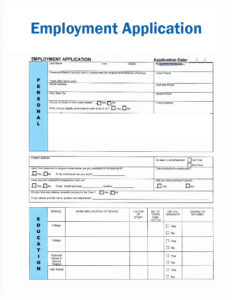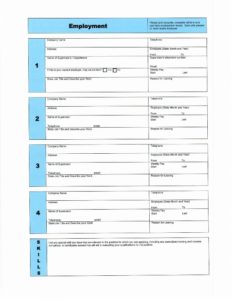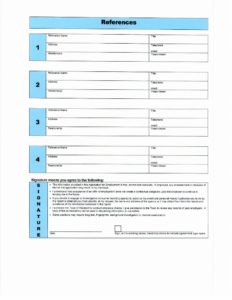1. When should you have an application for employment?
It is always helpful to have an application on file for all employees. However, when recruiting for professionals you may want them send you a resume first and if they are being asked to come in for an interview then you will want to have them complete an application so you have more specific information like dates of previous employment, confirmation of education degrees and that they signed that they understand misinformation is cause for dismissal, etc. For entry positions you may want to start with an application to see if people can follow instructions and if they meet the minimum qualifications.
If your organization has walk in candidates then you will want to have a application for them to complete and keep on file for future vacancies. If you have an online process then you may have the application format as a fillable PDF with the ability to attach a Resume.
2. What should be asked on the Application?
Section 1 – Personal Information
The first section should be personal information such as: Full Name, Date, Phone numbers, email, maybe city and state since most people receive information via email or phone; are they a citizen or legally authorized to work in the U.S; position they are applying for and whether they are available part-time or full-time, etc. Sometimes this section may include Military Service Dates.
Section 2 – Education
The second section should be about education including: the name of school, major or course of study, number of years completed and if they graduated, if so what type of degree. This should include a section for high school if entry positions, technical schools or trade schools, and undergraduate and graduate schools or space for at least two colleges.
Section 3 – Experience/Past Employment
The third section should include information for past experience and past employers. It should include the name of employer; type of employer – what they do; title of position; supervisor name and contact information (email/phone); dates of employment; reason for leaving; summary of past job description with the ability to attach resume with more details. Usually you have room for four past employers with a note to add pages as needed.
Section 4 – Special skills and Job requirements
The fourth section should be about special skills needed for the position – you can leave it open for candidates to fill in or have a list of special skills such as typing speed, driver license, certificates, trade licenses; ability to operate heavy equipment, training or knowledge in certain type of technology – hardware & software, etc.
Section 5 – References
Fifth Section can include references or you can wait till they are finalist to collect this information along with information for background and reference checks. Background checks could include: credit check, drivers license check, criminal & civil court check, drug tests and physical examination depending upon the position. It would be at this time you would collect birthdates, social security numbers and other private information after you have made a pre-offer pending background check.
Section 6 – Legal Agreement/Signature
The final section would be when you have the candidate sign their application. This is where a lot of legal items are listed which say you are agreeing to this if you sign. Some of the legal language includes;
- Misrepresentation of information can be cause for dismissal
- Acceptance of employment does not create a contractual obligation of employment for any set term
- If credit checks are done candidate has a right to get a copy per the credit report laws
- Authorization for the employer to do background and reference checks, etc.
3. What should not be on an Application form?
Most of the items that can not be on an application form are related to discrimination or privacy such as:
- Birth date (age discrimination)
- Gender, Marital Status, Race, disability (Title VII discrimination or ADA-Americans with Disabilities Act)
- Many states do not allow you to ask about criminal convictions
- New laws are being raised about not being able to ask about past salaries
- Graduation dates (age discrimination)
4. Should you ask essay questions on an application?
I do not recommend this – I think it should be a separate document or requested in the advertisement to be addressed in the cover letter. For example, for an entry level position you may wish the candidates to describe their technology knowledge or skill levels with certain software. You can also ask them to review the job description or advertisement and address how they meet the qualifications, knowledge, skill and abilities. I use a special questionnaire on many of my recruitments to find out more details about the candidates. This is done only if they meet the minimum qualifications and is used to reduce the list of qualified candidates. Some questions asked are:
- Provide an example of dealing with an irate customer
- Provide an example of a tough decision you had to make and provide details of the situation
- Provide an example of how your have worked cooperatively with a team
- Describe your strengths and weaknesses as it relates to this position
- What is your proudest accomplishment in your past positions?
- Why are you interested in this position and how does it fit into your career goals?



